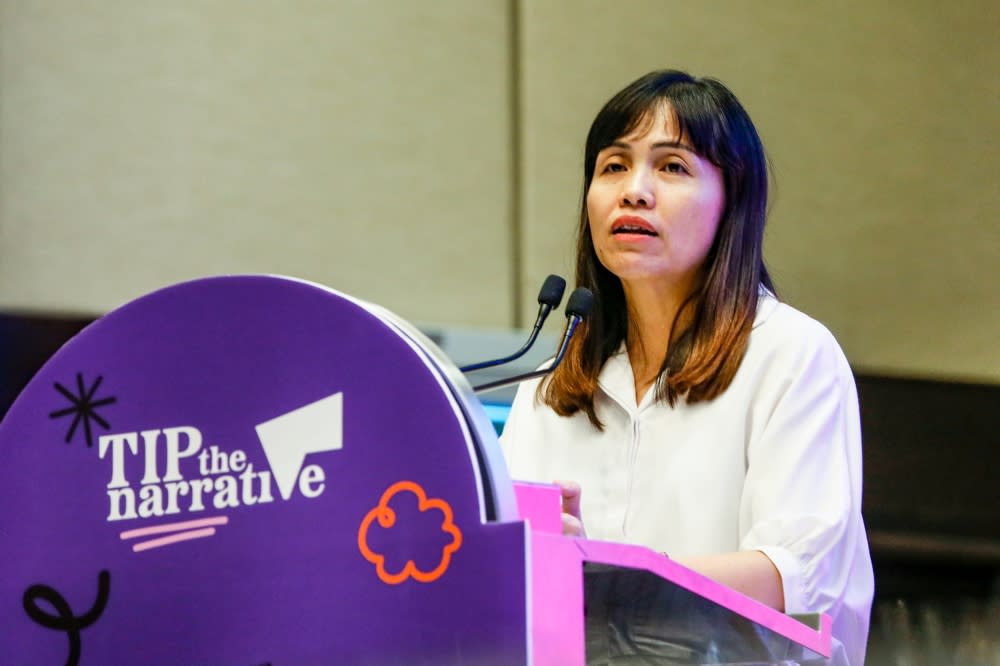With human trafficking on the rise, deputy minister sees pressing need to raise awareness of online scams

KUALA LUMPUR, Dec 5 — Communications and Digital Deputy Minister Teo Nie Ching has emphasised the need for more awareness and educational programmes to combat the rising threat of online scams, particularly those leading to human trafficking.
In a seminar titled “Tip the Narrative: Trafficking in the Digital Space” organised by Project Liber8, Teo shed light on the alarming intersection of technology and human trafficking, adding that her ministry and other agencies are working in tandem to increase awareness programmes and even producing a movie as part of such efforts.
Teo highlighted the impact of technology on criminal activities, with human traffickers exploiting digital platforms to control and exploit their victims. She stated that traffickers manipulate technology to control and exploit their victims, promoting job scams and forcing them to commit online crimes including fraud, identity theft, and hacking.
As of October 2023, the National Scam Response Centre (NSRC) recorded 58,980 calls, with 22,670 confirmed as genuine cases, resulting in a reported loss of RM203,274,426. Teo expressed concern about Malaysians falling victim to fake job scams and subsequently becoming targets for human trafficking.
In addition, child pornography, illegal drugs, fake passports, human organs for sale, prostitution, human trafficking and even contract killers for hire are among the nefarious activities that can be found on the dark web.
“Currently, there are 21 million victims worldwide who are believed to be victims of forced labour, with 20 per cent of human trafficking victims being children. The US Department of State Trafficking in Persons (TIP) 2023 report has placed Malaysia on the tier 2 watch list, signifying that it is not fully compliant but making ‘significant efforts’ to meet the minimum standards. This places Malaysia alongside Vietnam, Egypt, Brunei, Serbia, and others with similar statuses,” Teo said.
“To address these critical challenges, CyberSecurity Malaysia has initiated various programmes, including CyberSAFE (Cyber Security Awareness For Everyone) to educate and emphasise the significance of cyber awareness in utilising digital technology. This year, the ministry led by CyberSecurity Malaysia organised ‘Jelajah Anti-Scam Kebangsaan 2023’. This public awareness programme aims to provide knowledge to the public about the types of scam crimes, the latest modus operandi, as well as best practice tips to avoid being easily deceived and becoming a victim.”
Teo said there has been engagement with diverse communities through workshops and online initiatives and Project Liber8 has collaborated with non-governmental organisations, law enforcement agencies, and technology experts to develop strategies that fortify our defences against online threats and dismantle the networks that perpetuate trafficking in persons.
New Shu Shern, executive director of Project Liber8, said his group’s “Tip the Narrative” campaign was designed to bridge the gap between the public and the issue of human trafficking. Shern emphasised the need to simplify discussions around trafficking, making information more accessible and relatable.
She said Project Liber8’s online campaign has over a reach of over one million and 500,000 engagements, demonstrating the demand for meaningful conversations about human trafficking as well as a collaboration with Meta in 2024 to launch an online safety and digital literacy programme, aiming to empower individuals to contribute to a safer online community.
Apart from that, Teo concluded by announcing plans to collaborate with movie producers to create a film based on human trafficking. Inspired by the success of the Chinese production No More Bets, she expressed the hope that a Malaysian context film would raise awareness about the varied forms of human trafficking and the prevalence of scams within the country. The movie will serve as a crucial component of the anti-scam campaign, supported by the KKD.
No More Bets was very successful here raking in more than RM20 million in the box office making it one of the most successful Mandarin speaking movies in Malaysia, so I’ve met with two film producers who will work with Finas (The National Film Development Corporation) and the police to come out with similar movies but with a Malaysian context.
“We want Malaysians to realise that they’re not immune to similar scams because they might feel what’s happening outside won’t happen in Malaysia. Efforts are being made to make a film using scams as the crux of the story so that it can reflect what is actually happening on the ground,” she said.
No More Bets is a movie about two Chinese nationals trapped in a foreign country and forced into online gambling fraud.



